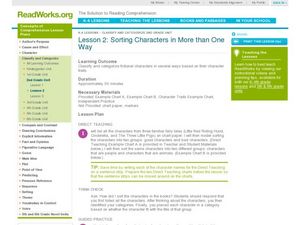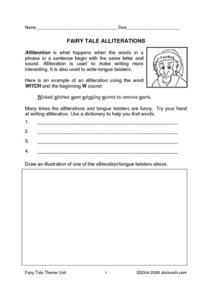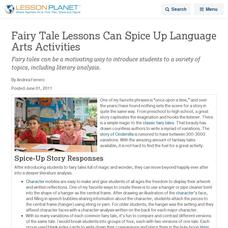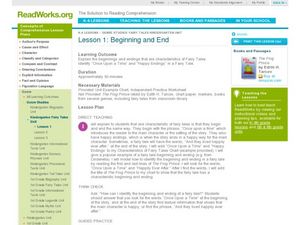Curated OER
Speak a Little Clearer!
What are the characteristics of effective public speaking? Emerging orators choose a fairy tale to present orally to the class. After modeling yourself, divide the class into small groups, having them critique each others' oral...
Curated OER
Sorting Characters in More Than One Way
Introduce your class to characterization. Familiar story characters are sorted into "good" and "bad" categories based on the characters' personalites and actions in the story. The class discusses and describes characters they have read...
Curated OER
Elements of the Oral Tradition
Various genres of oral tradition are outlined and defined in these slides. Give your class examples of folk tales, fairy tales, parables, fables, legends, and myths before reading an example of one of these stories. This overview acts as...
Curated OER
Fairy Tales
Students research the Internet using hotlists to find two different versions of a fairy tale after watching a teacher presentation of two versions of The Three Little Pigs. They design a PowerPoint presentation that shows the comparisons...
Curated OER
Fairy Tales Retold
Students use writing processes effectively to adapt and retell stories. They reread a favorite fairy tale, then adapt and retell in a PowerPoint or other multimedia presentation. They present their rewritten and edited presentations to...
Curated OER
Fairy Tales Word Search
Help make learning about fairy tales fun. Learners locate twenty words that are associated with fairy tales using this word search. They use the words in a table at the bottom of the page which include brave, king, princess, and witch.
Curated OER
Fairy Tales Word Search
Help make learning about fairy tales fun. Learners locate twenty words that are associated with fairy tales using this word search. They use the words in a table at the bottom of the page which include brave, king, princess, and witch.
Curated OER
Fairy Tale Alliterations
Fairy tales are the perfect way to focus on alliteration. Learners complete activities relating to alliteration and similes using a fairy tale theme. Then, they complete an acrostic poem using the words fairy tale.
Curated OER
The Setting of Any Fairy Tale
Focus on setting using this worksheet. Learners read a fairy tale and identify the setting for the story. They also list adjectives to describe it. In addition, they draw a picture describing the setting.
Curated OER
Fairy Tales and Folklore Tell about....
Every elementary age child learns about the different genres of literature, this PowerPoint will give them a clear idea of what to look for when identifying Folklore and Fairy Tales. Each slide describe the characteristics of Folklore,...
Curated OER
Hans Christian Andersen's Fairy Tales
A thorough lesson introduces learners to Hans Christian Andersen, the nineteenth-century author who created wonderful tales. They read the original texts of several of his stories, including "The Ugly Duckling," "The Little Mermaid,"...
Curated OER
Fairy Tale Lessons Can Spice Up Language Arts Activities
Fairy tales can be a motivating way to introduce students to a variety of topics, including literary analysis.
Curated OER
One Story, Many Tales
Students compare and contrast Cinderella stories. In this folktale lesson, students discuss the attributes of the genre and then read and research different cultural versions of the tale. Students present their findings to their classmates.
Curated OER
Lesson 3: Character Values
A value is something a person or character thinks is right or good; it's also a characteristic of a fairy tale. Learners discuss how fairy tale characters often have or exemplify a specific value. They compare the values found in The...
Curated OER
Lesson 1: Beginning and End
Students study fairy tales. For this fairy tales lesson, students discover beginning and ending phrases characteristic of these types of stories. They listen to their teacher read The Frog Prince, take notice of those familiar phrases,...
Curated OER
Lesson 1: Plot Problems
Add another characteristic to your class characteristics of fairy tales chart. First they discuss the concept of problems or conflicts found in most fairy tale plots then they practice identifying conflict as they read. They read the...
Curated OER
Compare and Contrast Fairy Tales
Second graders read and compare two versions of Cinderella. In this compare and contrast lesson, 2nd graders use a Venn Diagram to record comparisons between Cinder Edna and Cinderella. Students write a paragraph using those similarities...
Curated OER
Transforming Fairy Tales
Learners use technology to write original fairy tales. In this fairy tale lesson, students write their version of famous fairy tales using Alphasmart or computers. Learners illustrate their stories.
Curated OER
Fairy Tales
Sixth graders explore the elements of fairy tales. In this fairy tales lesson, 6th graders analyze several versions of Cinderella from around the world. Students graph fairy tale elements using Excel and create Venn diagrams comparing...
Curated OER
Funky Illuminated Fairy Tales
Students create their own fairy tale. In this book making instructional activity, students write a fairy tale and turn it into a book. They use decorated initials and borders to make it look like an illuminated manuscript.
Curated OER
Globe Trotting Cinderella
Students explore the fairy tale genre of literature. In this Cinderella lesson, students read fairy tales and discuss their attributes and cultural background. Students examine and write their own fractured fairy tales.
Curated OER
Comparing Tales through Performance
Students compare and contrast versions of The Three Little Pigs. In this fairy tale lesson plan, students read 3 versions of the fairy tale and dramatize them in order to analyze the similarities and differences.
Curated OER
Cinderella Is A Fella
Second graders identify the universal theme in the Cinderella story. In this fairy tale lesson, 2nd graders develop their vocabularies as they read a variation of Cinderella.
Curated OER
The True Story of the Three Little Pigs
Students explore expressive reading. In this literature lesson, students read the book The True Story of the Three Little Pigs and interpret key themes. Students perform a different version of the text.

























